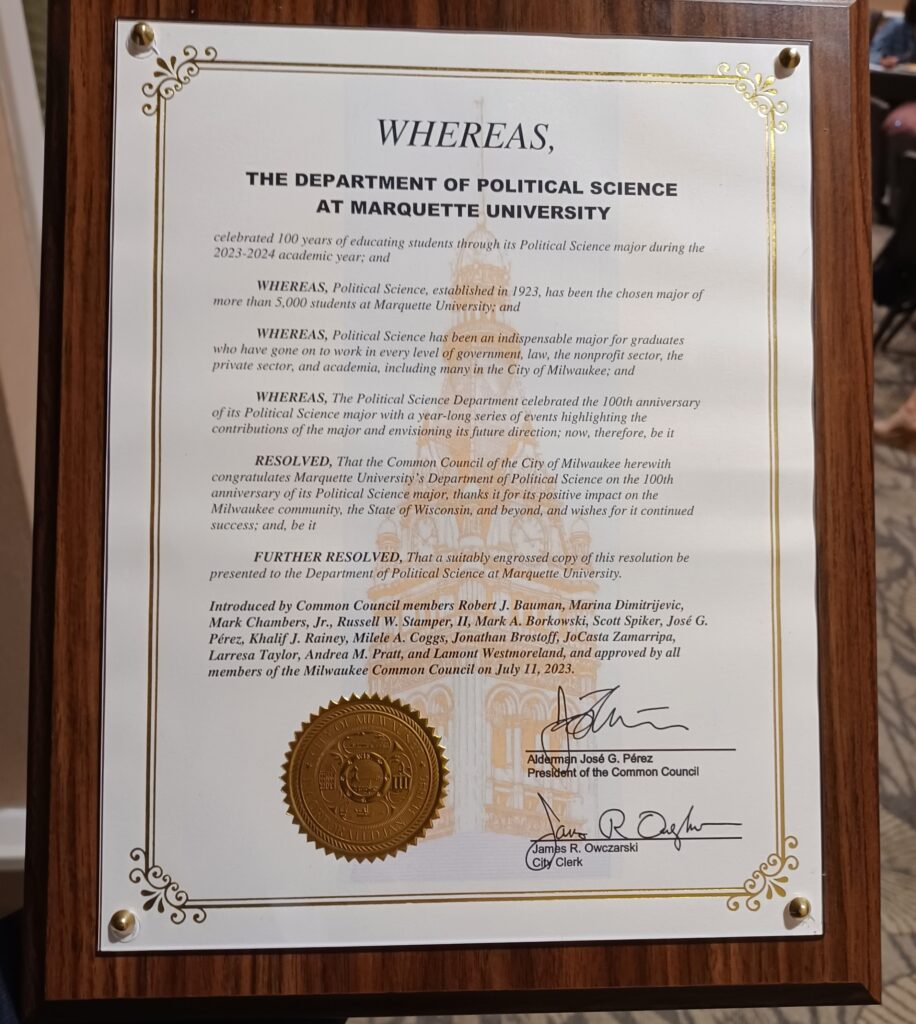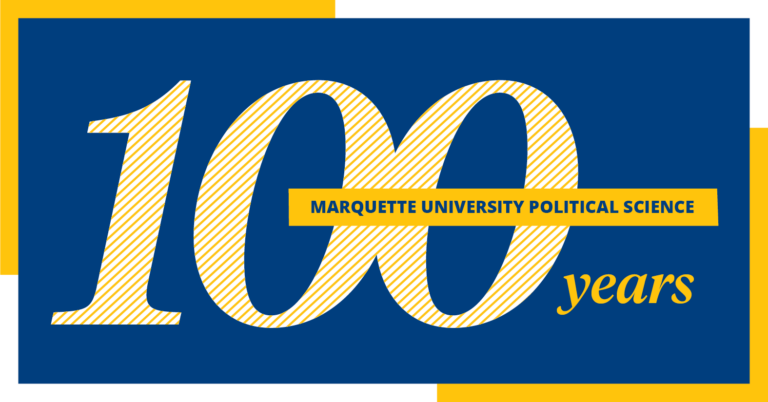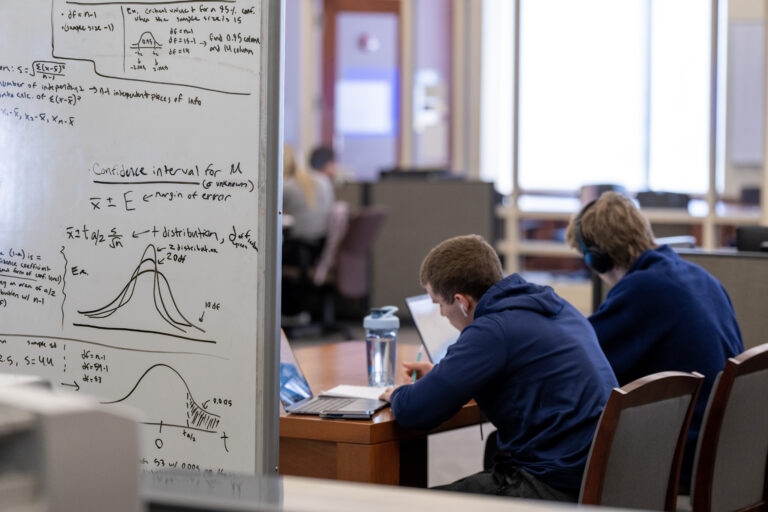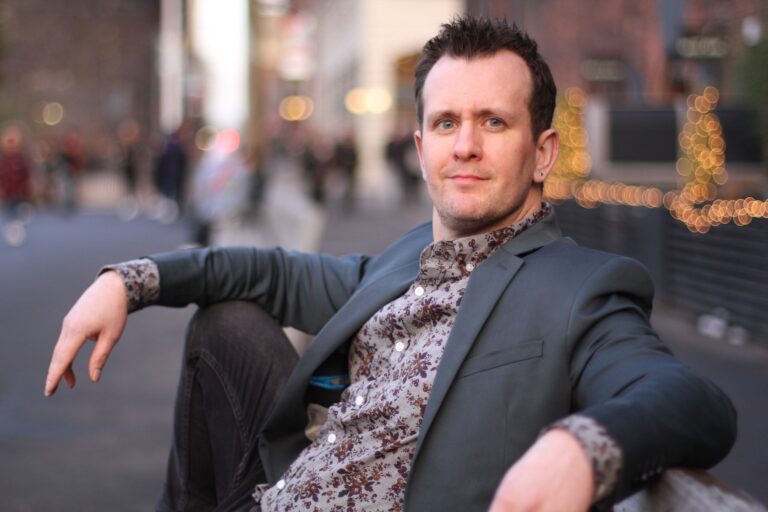For the past 100 years, Marquette’s political science program in the Klingler College of Arts and Sciences has provided a pathway for students to understand and engage in some of the most critical issues of our times. Whether learning how to deliberate pressing issues facing our world today in the Civic Dialogues program or allowing students to immerse themselves at the epicenter of U.S. politics in Washington, D.C., at the Les Aspin Center for Government, Marquette’s political science program continues to prepare students for fulfilling careers.
Since 1923, thousands of students have declared a political science major, helping them go on to serve in government, law, the nonprofit sector and academia, and, in turn, leaving an enduring imprint on Milwaukee, Wisconsin and the country.
Dr. Philip Rocco, associate professor of political science, has been teaching courses on American politics, public policy analysis and federalism, among others, for the past seven years. Reflecting on his time at Marquette and the program’s historic milestone, he says the university continues to be a thrilling place to teach about politics.
“Our students are creative, pragmatic and synthetic in their thinking — capable of grappling with big ideas in the classroom but also intent on thinking about their application in the real world,” Rocco says. “Consistent with our Jesuit ethos, they are also extraordinarily thoughtful about the moral and ethical consequences of political developments.”
Centennial celebrations
The Political Science Department has been celebrating the 100th anniversary throughout the 2023-24 academic year. Last September, the department hosted a panel and reception called the “Past, Present and Future of Political Science.”

“The idea was to reflect on the past, but also build a positive vision for the future alongside our students and to celebrate the 100th anniversary,” says Dr. Risa Brooks, Allis-Chalmers Professor of Political Science and chair of the 100th anniversary committee. “The reception included a panel discussion among political science faculty who research issues in American, comparative and international politics.”
The department was presented with an official commendation from the Milwaukee Common Council, honoring the political science program for “its positive impact on the Milwaukee community, the state of Wisconsin and beyond.”
The centennial’s premier event took place in October. “Celebrating a Century of Mission-driven Political Science” focused on the centennial milestone along with the Les Aspin Center’s 30th anniversary.

Dr. Paul Nolette, director of the Les Aspin Center and associate professor of political science, says the center’s legacy lies with its scholars.
“We help students find their vocation by exploring different career options, engaging with many interesting people and working on professional skills that will be relevant throughout students’ careers,” Nolette says. “Our legacy is the students and alumni who use their gifts after graduation to Be The Difference along their chosen path.”
Nolette and Rocco serve as editors of Publius: The Journal of Federalism, the world’s leading journal on federalism. As the journal’s host, the Department of Political Science will serve as a center of excellence for federalism scholarship in the United States.
“We are the fifth editorial team the journal has had since its founding in 1971 by the legendary political scientist Daniel Elazar,” Rocco says. “One of the defining things about Marquette’s editorship of the journal is that we are the first editorial team to be able to rely on the strengths of our entire department as editorial associates.”
Another marquee program in the department is Civic Dialogues. The program’s director, Professor of Political Science Dr. Amber Wichowsky, says it was formed out of the desire to create opportunities for all Marquette students to practice civic reasoning and discourse skills.

“Learning how to productively engage in good-faith disagreement is an important, lifelong civic skill,” Wichowsky says. “Without it, we make poorer arguments ourselves and miss opportunities to identify new ways to address old problems or to find common purpose around new challenges.”
Launched in fall 2021 with the generous support of donors, Civic Dialogues is grounded in the belief that addressing complex and contentious issues requires meaningful and reflective interactions across a range of perspectives.
These efforts are all part of the department’s commitment to engaging with the broader world, according to Dr. Julia Azari, professor of political science.
“Part of the purpose of creating knowledge is to share that knowledge,” Azari says. “Public-facing writing allows me to invite the broader public into the debates among scholars about how politics works.”
Like many of her colleagues, Azari is a prolific contributor to media outlets and writer for public audiences. The American Political Science Association recognized Azari’s contributions by presenting her with its inaugural Best Public-Facing Scholarship Award.
Looking forward
As Marquette marches into the next 100 years of political science, Brooks, who has spent the past 13 years at Marquette teaching classes on national and international security, has confidence that the major will continue to produce positive changes in the world.

“We hope to continue to grow and be able to cover new and important issues that concern our students and their communities beyond,” Brooks says. “The relationships between our faculty and students are especially cherished.”
“I believe that political science will continue to thrive,” Nolette adds. “Programs like the Civic Dialogues program and the Les Aspin Center continue to grow and expand, providing students additional opportunities to learn and engage with the most important challenges of our time.”



